Pilgrimage in the Middle East is normally associated with either Mecca or Jerusalem, so my yearly renewal of faith is a counterintuitive journey. My voyage starts in the Holy Land and ends in Amman, at the Middle East North Africa Club Championships. The annual MENA championships are only 3 years old, and they’re the only ultimate tournament in the entire region. I’ve made the trek to Jordan twice now since moving to Bethlehem, both times as a player and coach with the only frisbee team in the Occupied West Bank of Palestine.
My first time in Amman, for MENA 2016, I walked with the first ever Palestinian frisbee team to Hashemite Plaza. We drilled our decidedly avant-garde version of a vert stack and ripped skip passes off the sunken flagstones, the disc backlit against the dusk by the restored Roman Theater. I climbed up to street level to take a picture and there was a man selling cotton candy while the Palestinians played pick-up. The picture came out grainy and the detail isn’t significant, but I remember how the cotton candy was pink, the way the guy trudged forlorn hawking pink clouds in the twilight as the Palestinians played before a stadium that had been empty for over a thousand years.
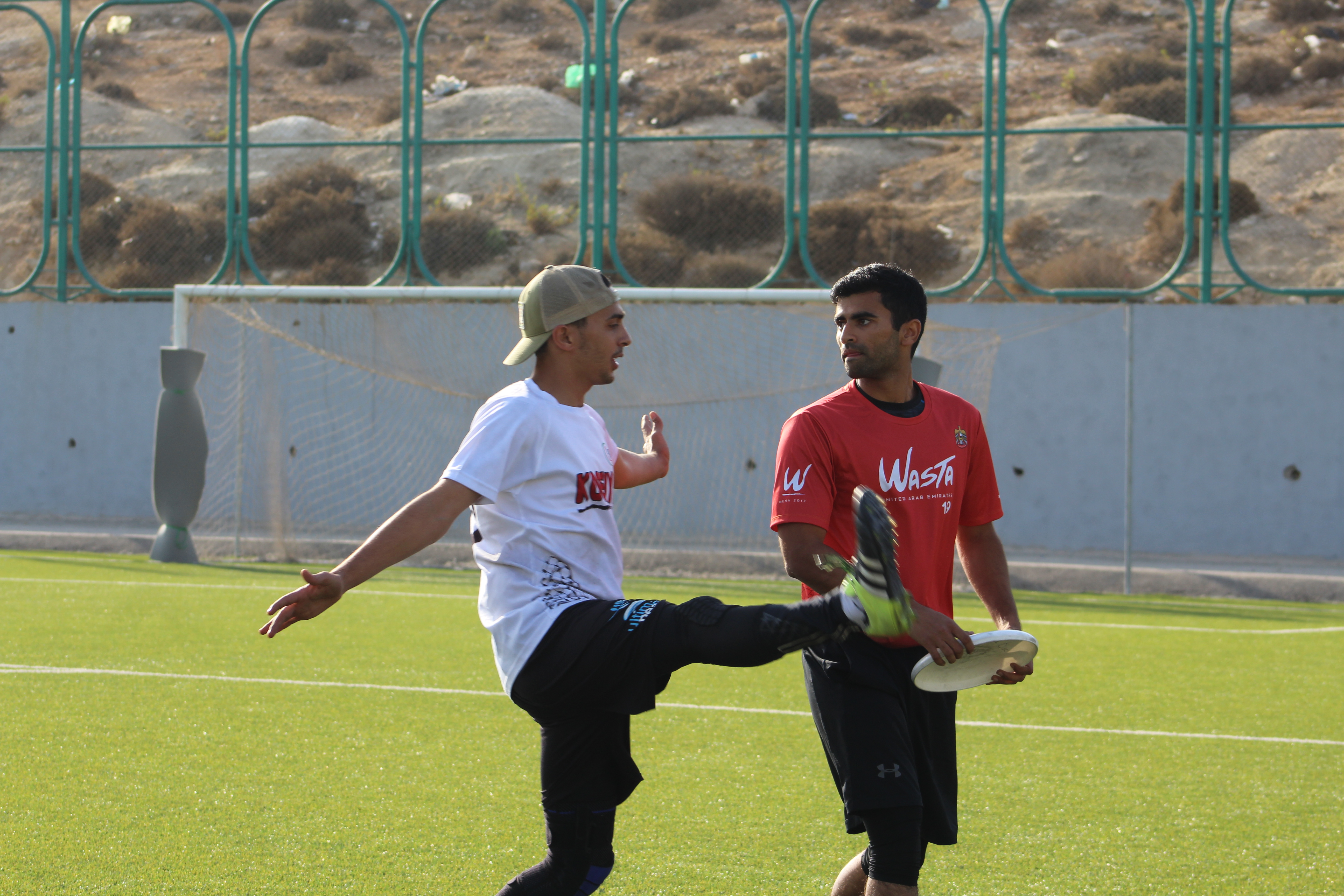
Mohammad Roman kicks his leg out on the mark.
The whole scene was enthralling and bizarre, chucking the disc at a 2nd century Roman theater in the Levant, and I thought, “Goddamn, frisbee is a magnificent game.” We lost every game at that tournament, and I got detained by border security for 2 hours and threatened with a lifetime ban from Israel on the way back, but it was still an exhilarating weekend for our team. Most of the Palestinians had never played a full game of ultimate before, had never even thrown a disc outside of the municipal field in their hometown, so the opportunity to play in a tournament with 12 Middle Eastern teams and meet players from over 25 different countries was a paradigm-shattering introduction to global frisbee culture.
The Palestinian team was founded and is largely held together by Daniel Bannoura, a local teacher and entrepreneur who is in some way the original Palestinian ultimate frisbee player. Dan, an amiable scholar who speaks English so well you would think he was from the States, was born in Palestine and picked up ultimate while getting his bachelor’s degree in physics from the University of Florida and his master’s degree in Islamic studies at the University of Chicago. He has received help at some key junctures, particularly in the very beginning from an American player and coach named Ben Spears, but foreigners come and go in the West Bank and the team is by and large a manifestation of Dan’s vision. What Daniel lacks in coaching experience, he makes up for in straight-up perseverance, and his dedication to developing ultimate in Palestine has brought the team a long way since I first met him last September.
I remember that first practice well – it was a ragtag affair. Some people weren’t in good enough shape to run one warm-up lap around the field, most people couldn’t throw a flick, and they were learning force, open side and break side completely backwards. Nobody had ever heard of a stack, in any direction. Despite all that, they had a dedicated core of players showing up every week, playing pick-up and falling in love with ultimate. I had been hoping to find a competitive team to practice with, but the reality was that with the exception of two other expats who occasionally made the trek from Jerusalem, my one year of college club experience made me the most experienced frisbee player in the West Bank. The only tournament I had played in since my freshman year at the University of Delaware was MARS 2016 in Pittsburgh, which is really more of a drunken spikeball and saturnalia-themed camping trip than a serious ultimate tournament. (That is not a criticism of MARS, which I highly recommend to any ultimate player who isn’t a Mormon or a Muslim.)
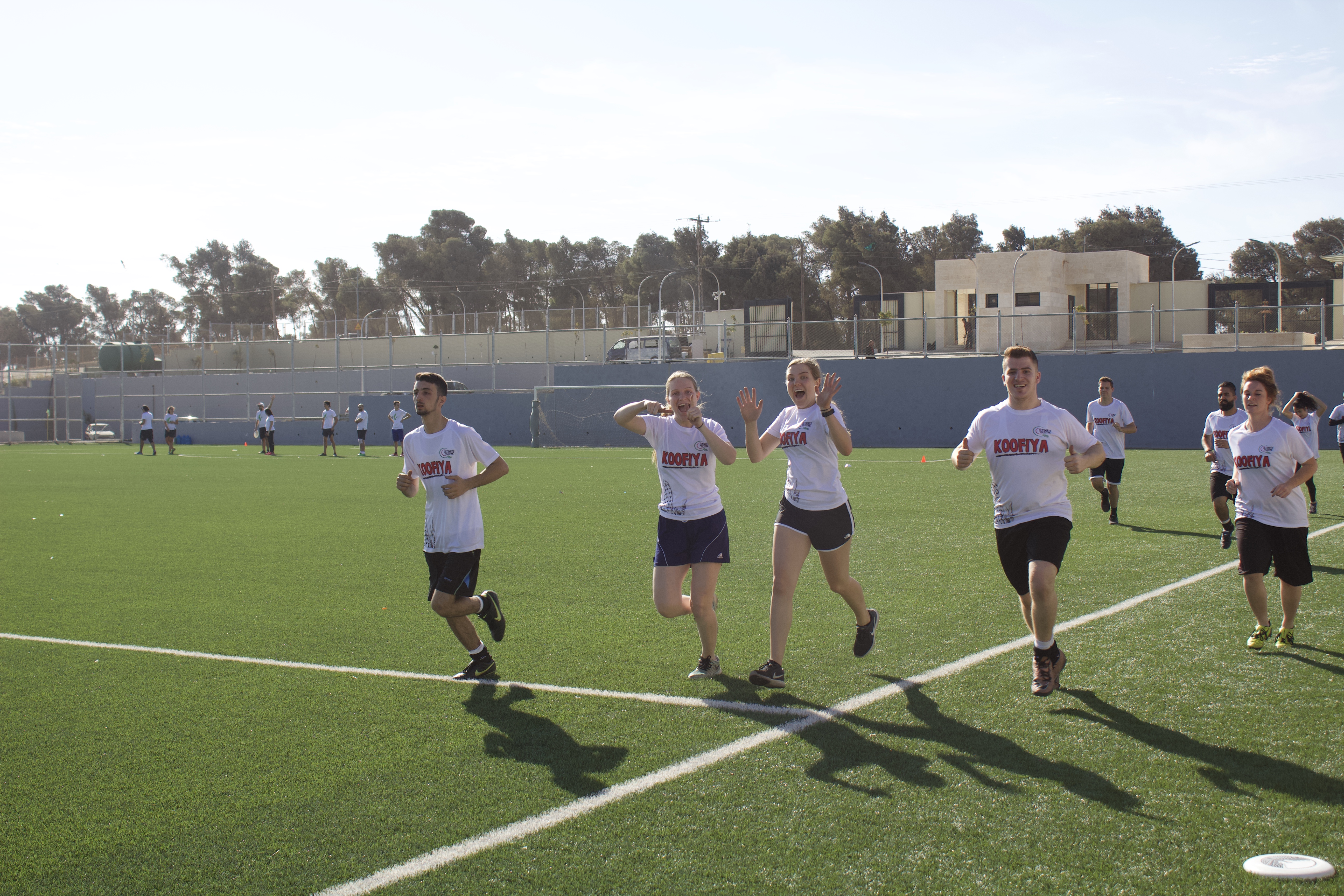
Koofiya warms up at MENA.
I ended up stepping into a coaching role I was woefully underprepared for, and it has turned out to be the most rewarding and perplexing cross-cultural experience I’ve had in Palestine. Nearly every Sunday night for the past year, I’ve been at the municipal field in Beit Sahur, teaching kids how to make upline cuts and trying to hit coaching points in mangled Arabic between drills and during line changes. More often than not, it comes across as impassioned gibberish. The older guys just smile and nod, and the younger kids stop me and very politely say, “Zane, just speak English.” I don’t really know how to coach, but I play the game with passion and bring some fire to the field. I’ve occasionally felt like I overstepped my bounds as a foreigner, pushing the team in a direction it doesn’t want to go in. Just as often I’ve been completely infuriated by the local players, who want to win games but have a complete disdain for discipline and repetition.
During one point at MENA 2017 one of our players told me that the stack doesn’t work for our team, and I told him as the pull floated in that we wouldn’t know if the stack works, since we’ve never actually run it in a game. I’ve gotten frustrated with my own lack of coaching ability or with the team’s lackadaisical attitude to the point that I’ve told Dan that I don’t want to coach any more, on multiple occasions. When I take a breath and a step back, however, the frustration melts away, and I’m left with a sublime appreciation for being in exactly the right place at exactly the right time to help get the Palestinian team off the ground.
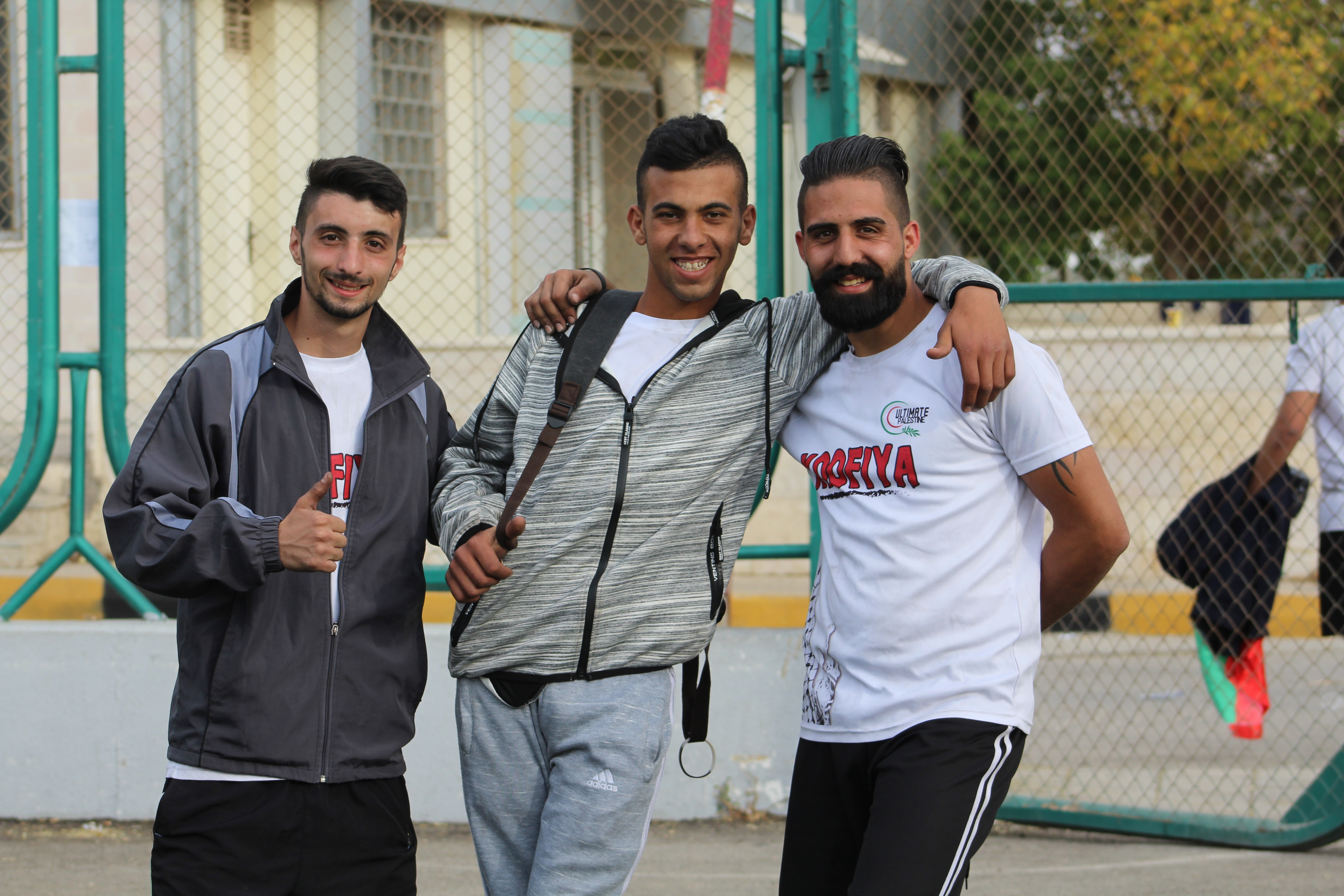
Yusif, Baha, and Iskandar pose for the camera.
My second trip to Amman, for MENA 2017, was less surreal but no less enjoyable. Saturday saw me basking on sun-warmed turf, savoring the post-second day ache in my legs and sipping a cold beer during the finals game. It was a perfect day for ultimate, about 70 and sunny with the softest whisper of a breeze, and I simultaneously admired and envied the two teams in the finals for their opportunity to revel in such a moment. The scene would have been familiar to any ultimate player, except the muezzin was wailing its old-world exaltation from the nearby mosque loudspeaker, the beer was Petra Beer (“taste of the rosy city,” the red cursive font of the logo and the syntax of the slogan clearly drawing heavy inspiration from Coors Light) and the two teams in the finals, Wasta and Dubs, were both from the United Arab Emirates. Dubai has a high concentration of both expatriates and wealth, so they tend to field the strongest teams in the region, but Jordan has the largest program, with a good mix of expats and local players. The Palestinian team, rechristened as Koofiya and bolstered by four Mormon free agents who were in town with a Brigham Young religious immersion program, netted its first victory in club competition, and I crossed back into Israel without issue. It was an excellent weekend.
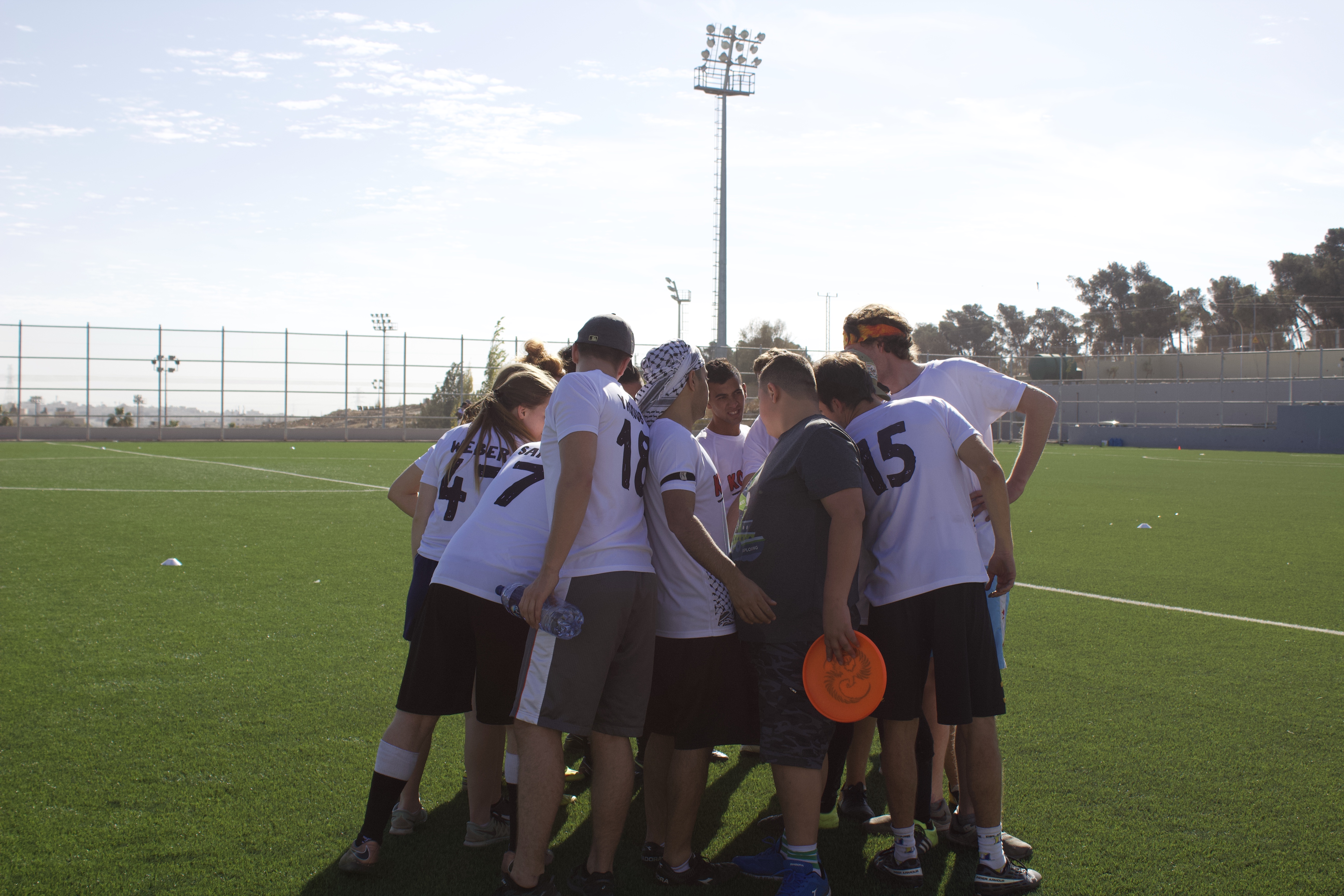
Koofiya huddles.
About a week after this year’s MENA tournament, the Palestinian Flying Disc Association was accepted as the 76th national member association of WFDF. Hearing from Daniel that our scrappy little frisbee community in Palestine had achieved enough critical mass to be accepted as a WFDF member was a moment of pure elation. As a rookie scrounging for field time with Sideshow back in 2011, I could never have told you that a peculiar marriage of interests and a character-defining brand of iconoclastic skepticism would eventually lead me to the unlikeliest frontier of frisbee, helping to establish the sport in the most culturally, politically, and religiously contentious place in the world. I transferred out of Delaware after my freshman year, and the intervening five years took me on a circuitous journey away from high-level ultimate and towards the Middle East, driven primarily by a deep curiosity about the Arab world, a speculative empathy towards the unmentioned culture of a people labeled enemy, and an existential ambivalence about what it really means to be an American. Through a string of seemingly disparate events including a summer language study abroad in Beirut, a year-long stint living and working on a cruise ship and an unlikely friendship with a Catholic brother named Ralph, I stumbled into a unique opportunity to live and volunteer in the West Bank. I have experienced the rhythms of daily life under military occupation, albeit from the privileged perspective of one who gets to leave whenever the oppression becomes too oppressive.
My time in Bethlehem has in many ways proven to be a confounding rather than an elucidating experience, and I’ll return home more cynical than when I left, both about the prospects for an equitable solution to the political situation in Israel and Palestine and the collective nature of humanity in general. That being said, my unique opportunity to bear witness to the beginning of ultimate frisbee in Palestine has been a deeply satisfying manifestation of my initial desire to come to the Middle East and create human relationships, and playing ultimate with Arabs is the only pursuit I’ve found that strikes a balance between an essential need for personal joy and a responsibility to my conscience in a world that seems filled with hate. In the midst of what has turned out to be a quixotic pursuit of truth, it has been gratifying to watch ultimate flourish in Palestine and across the entire Middle East.
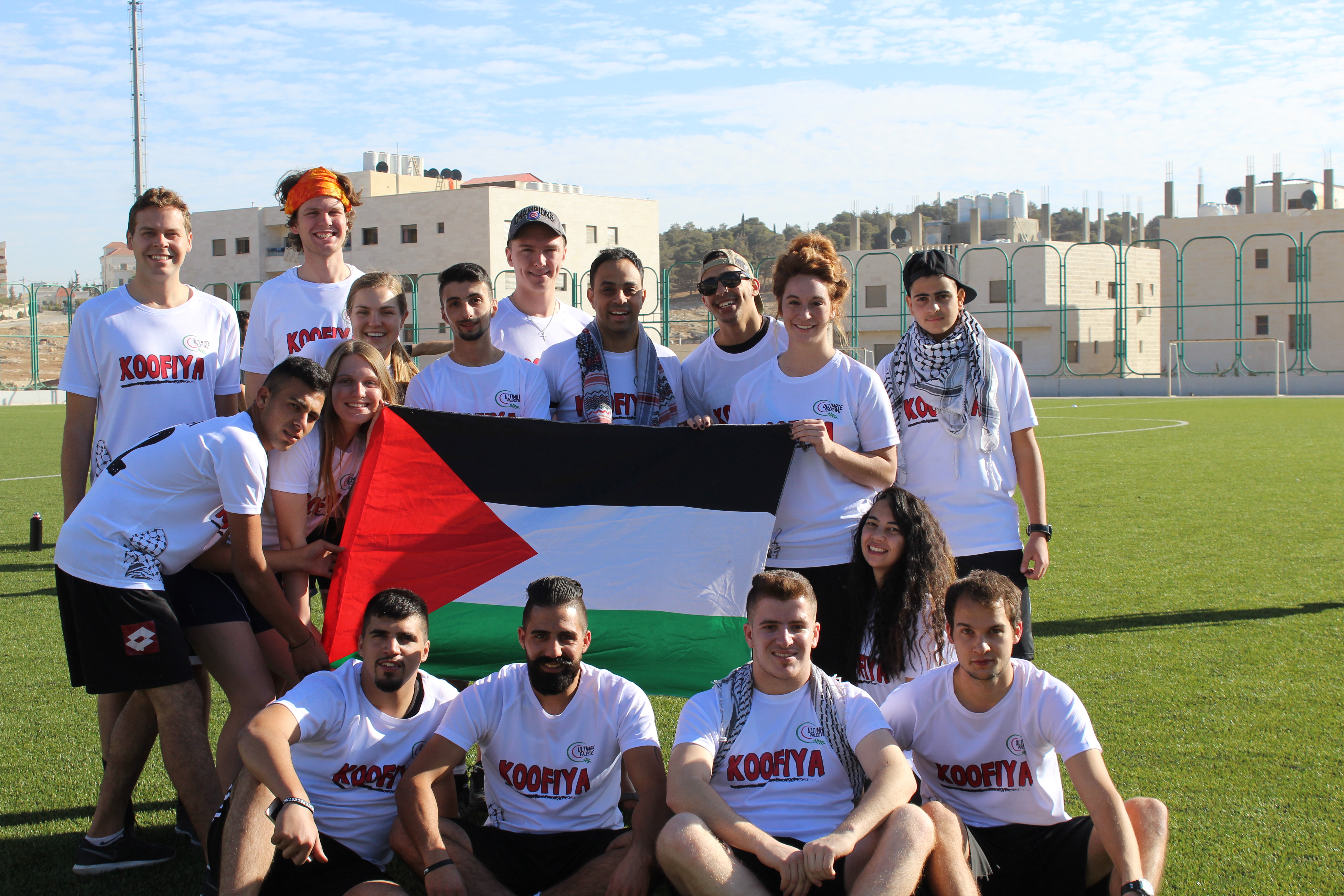
Koofiya 2017





Comments Policy: At Skyd, we value all legitimate contributions to the discussion of ultimate. However, please ensure your input is respectful. Hateful, slanderous, or disrespectful comments will be deleted. For grammatical, factual, and typographic errors, instead of leaving a comment, please e-mail our editors directly at editors [at] skydmagazine.com.